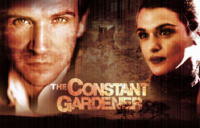The Constant Gardener
 Official Constant Gardener Site
Official Constant Gardener SiteDrama/Thriller
Starring Ralph Fiennes, Rachel Weisz, Danny Huston, Hubert Kounde, Bill Nighy, Gerard McSorley
Rated R (for language, violence and sexual situations/brief nudity)
Running Time: 129 Minutes
Released:August 31, 2005



3 Out Of 5 Bites
From out of Africa (and the John le Carre novel) comes the latest scourge with which Brazilian director Fernando Meirelles would have us embrace with our righteous indignation. Here, the nefarious beast- not as primal as the African landscapes that contain the blood spilt by it- is multi-headed, immeasurably wealthy and indiscriminately cold and obtuse when pushed to serious inquiry.
Meirelles must conjure from within our imaginations a gorgonian monstrosity- a drug company- from a sea of multi-national pharmaceutical corporate conglomerations that he hopes is playing there in the dark somewhere. He can at least bank on the audiences' familiarity with "Big Oil," "Big Energy" or a Big "Anything." Now, it's "Big Drugs" that towers over the small with greedy and murderous sticky fingers.
The Constant Gardener lays its bet on the contemporaneousness of the plaguing problem of giant pharmaceuticals having to somehow make financial ends meet while the poorest of the poor wither away, drugless. Or, in this case, drugged like guinea pigs on safari, but with vile, deadly toxicity. And if you want poor, sick and desperate, look to Africa, which is what Gardener does in order to expose the pharmaceutical's conspiratorial scheme.
The story opens with a murder we don't see and from there, relies on backtracking, reflecting and remembering to plant the plot. Ralph Fiennes plays British-diplomat-to-Kenya, Justin Quayle. He quickly becomes ensconced with Tessa, (Rachel Weisz), who stands up at the end of one of his presentations and hurls upon him a load of idealistic, political counter-point vomitus. The emittance clears the room, save for a very understanding Quayle, who more than cleans up; he lands a lover and very quickly, a wife. And the transpiration toward their wedded bliss seems contrived on her part, as she poses the question to him as he is embarking to Africa. From this scene, she establishes herself more as the expedient and deft politico between the two of them. It might not be said that Tessa doesn't think she loves him, she just may not be aware that she loves her growing cause more. Did she hook up with him for this convenience, or does the marriage and the location provide a fertile soil for her idealism? The credibility of their being together isn't helped by her "I feel safe with you" posited to him after their lust-romp.
However, her secrecy will not let him protect her, as we see Quayle's boss and friend, Sandy Woodrow (Danny Huston), inform him of his wife's death. Yet the story plows away into the deepening mystery of Tessa's life, once blind to Quayle but now as openly insidious to him and his compatriots as a gnawing chinch bug. Here is where the ethos of her presence is questionable, right down to the liasons she has with the African doctor (Herber Kounde). Her pig-headed quest even leads her to morally reprehensible possibilities that seem a bit implausible in the context of what should be a caring marriage. What is left is the nest she stirred up by outing the drug company, which was the incitement to her murder and Quayle must finish what she started to honor her memory.
But as the veil falls away, and while Tessa's shrewdness is what Gardener relies on as the antithesis to the quietude of Quayle, it is the latter who anchors the garden. Fiennes has an ability to compact his character so deeply inward that one strains to elicit from him what he knows there. The tamed exterior of Fiennes' Quayle belies a welcome vulnerability that subtly and effectively plays on his countenance (as in the shot where he learns of Tessa's death). The emotional reveal there is from a learned containment, and it leaves the audience with the task of finishing the emotions and words for him.
When Quayle returns to Europe with the puzzle pieces in position to fit before him, he connects to his pain outside the London apartment where he and Tessa were first together. This is the most wrenching and honest moment of Fiennes' and of anyone else in the movie for that matter. He carefully understands the moment and luckily hasn't overexposed his character up to that point so that emotionally, he has somewhere to go. All this with the background of the learned evil intentions of a goon of a corporate magnate (Gerard McSorley) and Bill Nighy as a British lord. Their contributions to the film are noteworthy as well.
Though not USA for Africa (or Great Britain for Africa for that matter), the movie might tend to hang around like a cheesy 80's leftover single, were it not for Fiennes' performance. The tapes rolled, the stars sang and the world looked for a moment and then moved on. The African backdrop here unintentionally eclipses the much larger plight in reality, and Gardener leans a bit self-serving in some of its preacheriness. It paints a tragedy, but it is a finger-painting and our fingers are messy and wet. What's worse, we haven't been told how we can begin cleaning them.

<< Home